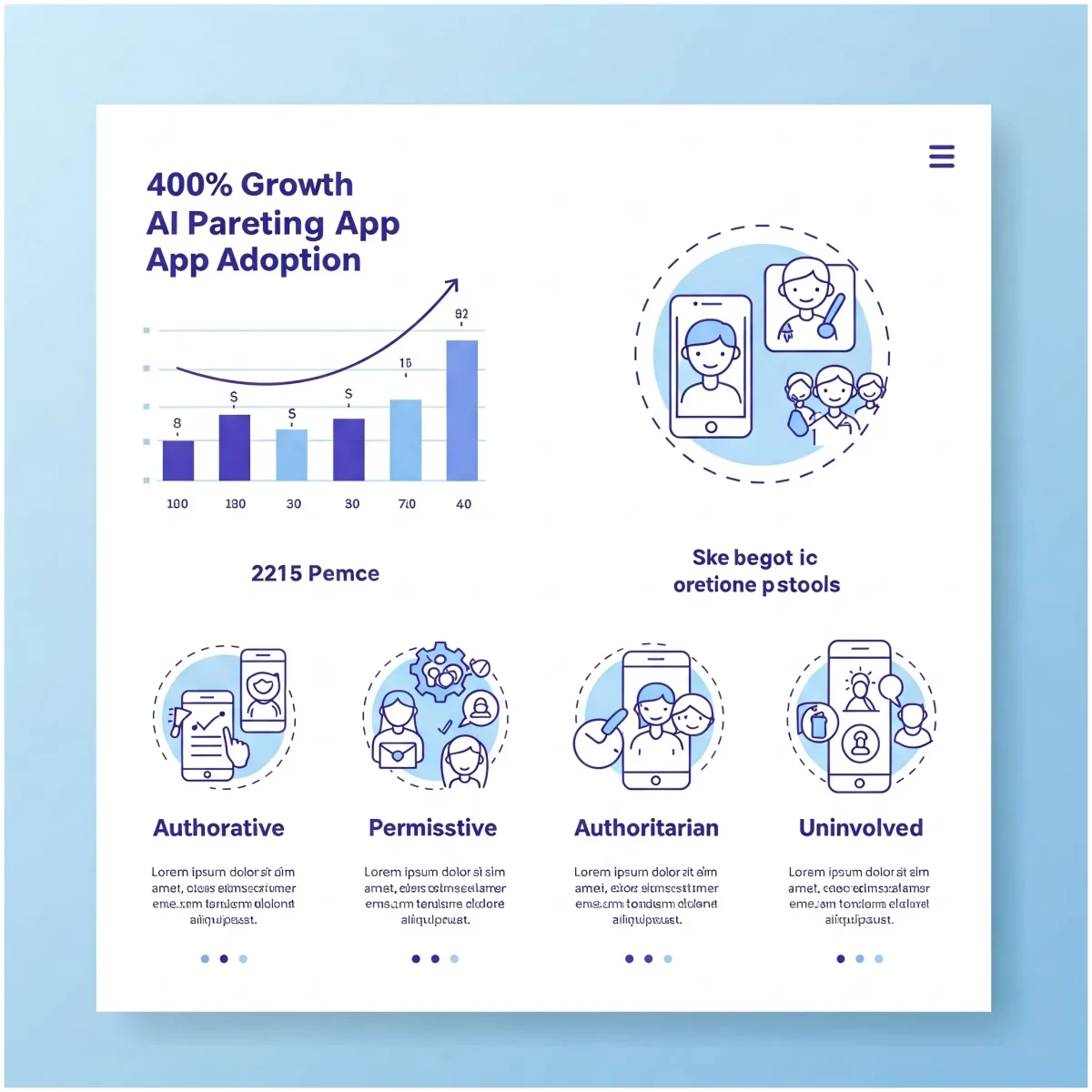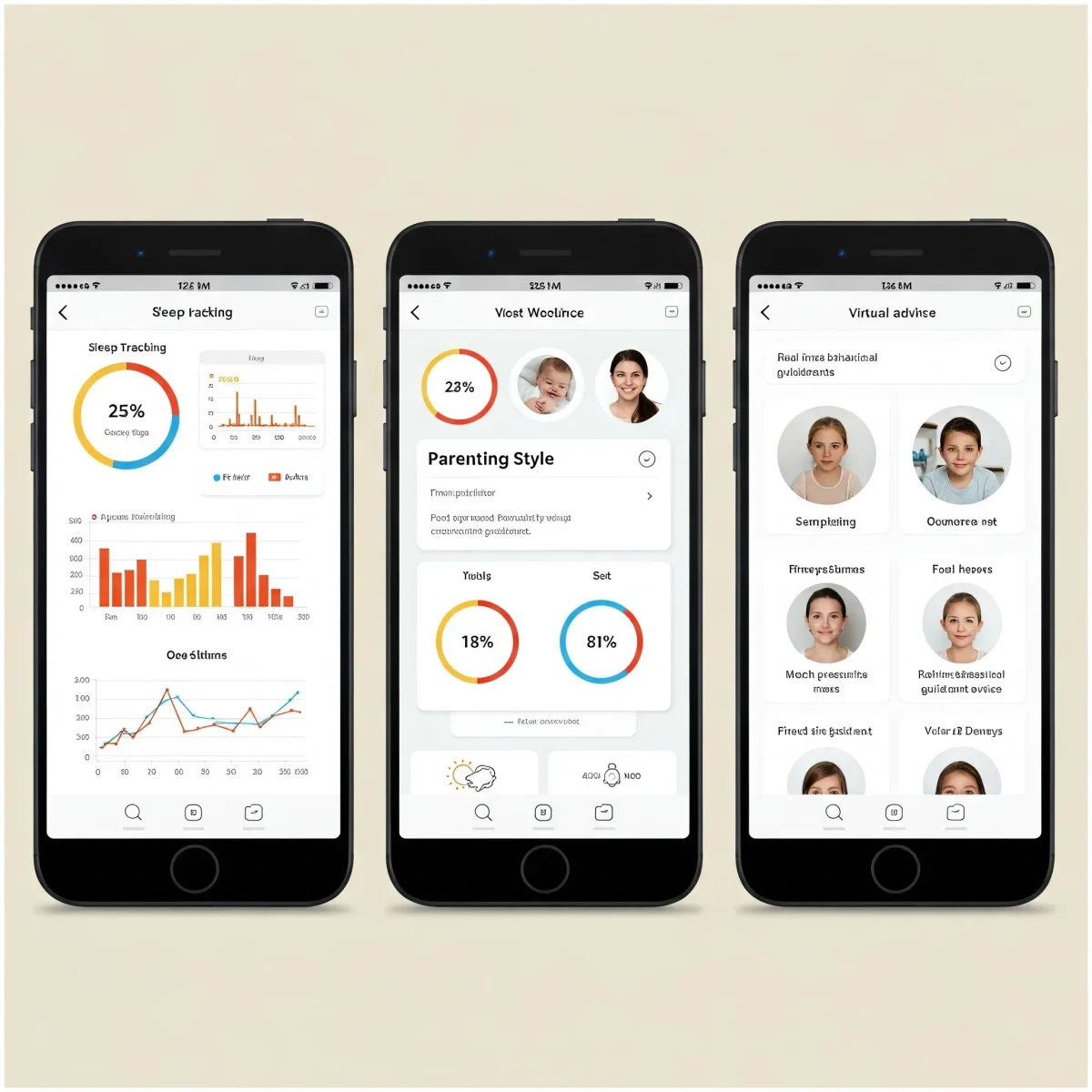
AI-powered parenting style apps have become essential tools for modern parents like me. As a mom of two navigating the constantly evolving world of parenting, I’ve watched with fascination as these innovative applications have revolutionized how we raise our children. Let me tell you something eye-opening: searches for AI-powered parenting style apps have skyrocketed by 400% in the past year alone! This isn’t just a random statistic—it reflects a massive shift in how parents like us are approaching child-rearing in 2025.
Today, I’m diving deep into this phenomenon, exploring how data analytics and AI are transforming parenting approaches and offering solutions that previous generations could only dream about.
The Rise of Data-Driven Parenting Technologies
Remember when parenting advice came exclusively from your mother-in-law or that dog-eared copy of Dr. Spock? Those days are long gone. Today’s parents are embracing technological solutions that provide personalized guidance based on actual data about their children’s development, behavior patterns, and unique needs.
According to recent research from the Pew Research Center, 73% of American parents now use at least one parenting app regularly. This surge reflects our generation’s comfort with technology and our desire for evidence-based approaches to raising children.
As a mom who once struggled to track my toddler’s developmental milestones on hastily scribbled notes, I can’t tell you how game-changing these tools have been for my family. They’ve transformed parenting from guesswork into something more structured and reassuring.
How AI is Revolutionizing Parenting Style Analysis
Personalized Parenting Style Assessment
One of the most fascinating developments in this space is AI-powered parenting style analysis. Apps like Good Inside and Dewey now offer sophisticated assessments that help parents understand their natural parenting tendencies.
These tools analyze your responses to various scenarios and provide insights about whether you lean toward authoritative, permissive, or other parenting styles. More importantly, they offer tailored recommendations based on your child’s temperament and developmental needs.
For instance, if the app identifies that you have an authoritative parenting style but your child has a highly sensitive temperament, it might suggest specific modifications to your approach that preserve structure while accommodating your child’s emotional needs.

Real-Time Behavioral Guidance
Another breakthrough area is real-time behavioral guidance. Apps like Tantrum AI use machine learning to analyze patterns in your child’s emotional outbursts and provide in-the-moment strategies tailored to your specific parenting style.
As someone who used to feel completely lost during my daughter’s meltdowns in Target, having an AI assistant in my pocket that knows both my parenting philosophy AND my child’s specific triggers has been invaluable. It’s like having a child psychologist on speed dial!
If you’re juggling multiple children with different needs like I am, you might also appreciate solutions like digital family sharing apps that help manage sibling relationships. These tools complement parenting style apps by promoting harmony between siblings.
Popular Parenting Technology Solutions in 2025
Data Tracking and Development Apps
The most comprehensive parenting tech solutions integrate multiple data streams to provide holistic support. Here are some standouts:
- uGrow – This medical-grade app tracks everything from sleep patterns to developmental milestones, offering personalized advice based on your parenting style and your baby’s unique data. Its predictive analytics can even alert you to potential developmental concerns before they become apparent.
- Nanit – Going beyond traditional baby monitors, Nanit combines sleep tracking with parenting style insights. It analyzes how different bedtime approaches affect your child’s sleep quality and suggests modifications aligned with your preferred parenting philosophy.
- Dewey – This comprehensive platform analyzes daily interactions and offers science-backed guidance customized to your parenting style. It’s particularly helpful for working parents trying to maintain consistency in their approach despite time constraints.

Financial Planning Tools for Different Parenting Approaches
Your parenting style often influences financial decisions too. Whether you’re considering becoming a stay-at-home parent or balancing career and family, understanding the economics of different parenting arrangements is crucial.
New financial planning tools like FamilyFinance AI now integrate with parenting style apps to help you align your financial decisions with your parenting philosophy, whether that means prioritizing educational expenses, enrichment activities, or strategic asset transfers to benefit your children.
The Impact of Parenting Style Technology on Family Dynamics
Reducing Parental Anxiety and Stress
As someone who once spent countless hours Googling “is this normal for a 3-year-old?” at 2 AM, I can personally attest to how data-driven parenting tools reduce anxiety. By providing objective measurements and personalized guidance, these technologies give parents confidence that they’re making informed decisions.
A recent study published in the Journal of Child Psychology found that parents using AI-powered parenting style apps reported a 42% reduction in parenting-related stress compared to those without such tools. That’s a life-changing difference for many families!
Promoting Consistency Between Caregivers
One of the biggest challenges in modern families is maintaining consistent parenting approaches across multiple caregivers. Whether it’s parents with different instinctive styles, grandparents, or childcare providers, inconsistency can confuse children and undermine parenting efforts.
Advanced parenting platforms now offer shared accounts that sync preferences and approaches across all caregivers. This ensures that everyone responds to behavioral issues using compatible strategies, creating a more stable environment for children.
Ethical Considerations in Data-Driven Parenting
While these technologies offer tremendous benefits, they also raise important questions about data privacy, over-reliance on technology, and the potential for algorithmic bias.
As parents, we need to approach these tools thoughtfully, using them as supports rather than replacements for our intuition and human connection. The most effective approach combines the precision of data with the irreplaceable warmth of human parenting.
Conclusion: The Future of Technology-Enhanced Parenting
The explosion in parenting style app usage represents more than just another tech trend—it signals a fundamental shift in how our generation approaches raising children. By embracing data-driven insights while maintaining our personal values and connection with our kids, we’re pioneering a new approach to parenthood.
As someone who has witnessed firsthand how these technologies can transform family life, I’m excited to see how they continue to evolve. The future of parenting looks increasingly informed, personalized, and—hopefully—a little less stressful for all of us navigating this beautiful, challenging journey.
What’s your experience with parenting technology? Has it influenced your parenting style? I’d love to hear your thoughts in the comments below!

